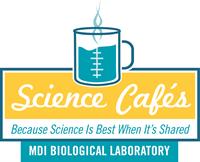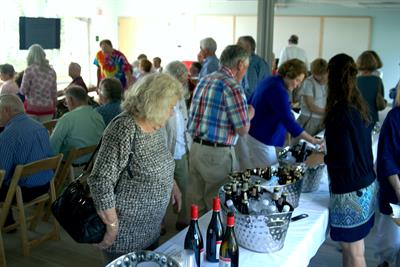-


MDI Science Café — The Frontiers of Cancer Research
Date and Time
Monday Mar 11, 2019
5:00 PM - 6:00 PM EDTLocation
The location of this MDI Science Café is the Maine Center for Biomedical Innovation at the MDI Biological Laboratory, located at 159 Old Bar Harbor Rd in Salisbury Cove, Maine.
Fees/Admission
Free of charge
Contact Information
Amy Morley
Send Email
Description
Most people are familiar with traditional cancer treatments such as surgery, radiation and chemotherapy, but many aren’t as familiar with next-generation cancer therapies that, because they target cancer cells more precisely, are better tolerated by patients and lead to improved outcomes.
Indeed, these new therapies are a contributing factor in a significant increase in cancer survivorship. The percent of cancer survivors living five years or longer after diagnosis was 69.3 in 2009, the most recent year for which there are statistics, according to the National Cancer Institute — up from less than 50 percent in 1975.
These figures put the trend on track to meet a U.S. Department of Health and Human Services target of 71.7 percent by 2020, and augur improved health for many of the more than 1.7 million people diagnosedwith cancer in the United States each year.
The role of next-generation therapies in cancer treatment will be the subject of the March 11 MDI Science Café by cancer biologist/immunologist Muneer G. Hasham, Ph.D. In his talk, Hasham will draw on his research on new cancer therapies at The Jackson Laboratory in Bar Harbor.
“My hope for the future is that cancer will no longer be a death sentence,” he said. “Rather, a patient will get sick, get treatment and get better. We will always develop cancer as long as cells are replicating and mutating within our bodies. What we need to do is to learn to manage it, just as we have learned to manage asthma, or fever.”
The next-generation therapies Hasham will talk about include:
- Immunotherapy — The immune system routinely eliminates cancer cells, but some cancer cells can trick the immune system into ignoring them or even into giving them a helping hand. Immunotherapy makes these cells easier to find while also reinforcing the immune system’s ability to destroy them.
- Genetically targeted chemotherapy — Many cancer patients don’t respond to chemotherapy. The goal of genetically targeted chemotherapy is to remove the guesswork — and reduce the time spent on treatments that don’t work — by using genetic information from a patient’s cancer cells to guide better treatment.
- Oncolytic virus therapy — Oncolytic virus therapy uses viruses that have the capability to target cancer cells. These viruses are considered by some to be a form of immunotherapy since they also mobilize the immune system to defend the body against cancer.
- Combination therapy — Rather than sequentially trying various treatment options until the patient responds, combination therapy — also called multi-modal therapy — combines treatment approaches from the outset of treatment. The combined effect can extend survival longer than an individual option on its own.
Doors open at 4:30 p.m. You may preregister for this event. A physical ticket or order confirmation email is not needed for entry.
MDI Science Cafés are offered in fulfillment of the institution’s mission to promote scientific literacy and increase public engagement with science. The popular events offer a chance to hear directly from speakers about trends in science. Short presentations delivered in everyday language are followed by lively, informal discussion.
Video
Images
.jpg)
Gallery Image
.jpg)

Gallery Image

Tell a Friend
-
 Plan Your Experience
Plan Your Experience- Stay
- See & Do
- Eat & Drink
- Know Before You Go
- Gatherings
- Experiences
-
It all starts with a visit...


